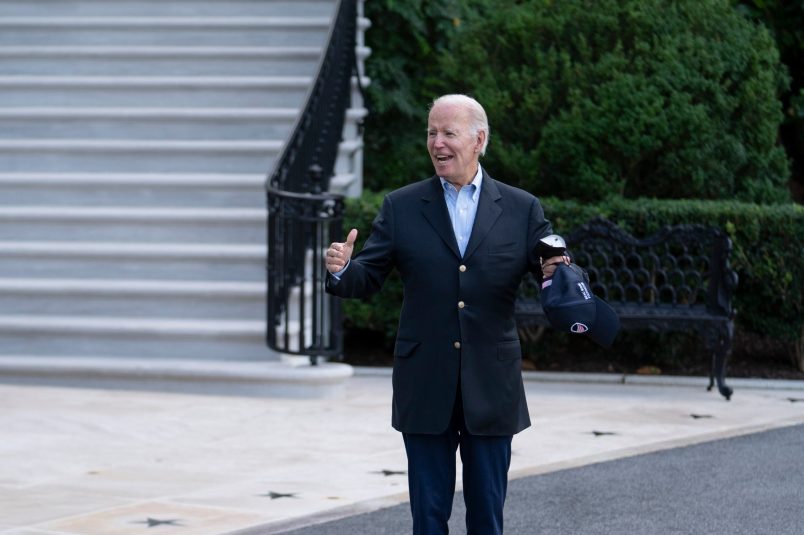In a matter of weeks, Democrats exchanged fists shaken in rage for those raised in triumph, as a slimmed-down reconciliation bill came abruptly back to life, bringing with it transformational and historic climate provisions.
“It’s infuriating and nothing short of tragic that Senator Manchin is walking away, again, from taking essential action on climate and clean energy,” Sen. Tina Smith (D-MN), one of the most climate-focused Democrats, said in a statement on July 15.
“Holy shit,” she tweeted 12 days later. “Stunned, but in a good way. $370B for climate and energy and 40% emissions reduction by 2030.”
“BFD,” she concluded, a nod to President Joe Biden’s famous assessment of Obamacare.
“This is one of the most tenuous pieces of legislation on any topic I’ve seen wend its way through Congress,” Matto Mildenberger, an assistant professor of political science at UC Santa Barbara specializing in the political drivers of inaction on climate change, told TPM. “The reframing and understanding that a climate-friendly future is one of economic opportunity and increased quality of life — not a bill that focuses on sacrifice and punitive policies — was what allowed this bill to pass in this extremely divided and complex moment.”
And per early analyses, the Inflation Reduction Act — due for a vote in the House this week, where it looks almost certain to pass — is not mere green theater.
Three reports have found that the bill would drive down carbon emissions by somewhere in the neighborhood of 40 percent from 2005 levels by 2030. The Princeton University-led REPEAT Project pins it at about 42 percent; climate policy firm Energy Innovation offers a range of 37-41 percent; and the energy and climate analytics firm Rhodium Group gives a range of 31-44 percent, with a central estimate of 40 percent.
Biden’s goal is to cut carbon emissions in half by 2030 — a milestone suddenly possible thanks to this legislation.
“If Congress passes this package, additional action from executive agencies and subnational actors can put the US’s target of cutting emissions in half by 2030 within reach,” said the Rhodium Group’s report.
Using executive action (in parallel with state, local and private-sector action) to bridge the gap is a very different prospect than the one Biden faced a few weeks ago: filling an absolute climate void left by Congress with whatever he could do unilaterally.
And carbon reduction isn’t the only bright spot in the legislation, per these analyses. The bill works primarily by supercharging investment in the green and renewable energy space. That means speeding deployment of clean electricity and electric vehicles, driving development of nascent and currently unscalable, expensive technologies like carbon capture and storage, incentivizing increases in the energy efficiency of buildings and funneling money towards efforts to conserve forests and farm lands.
The knock-on effects are good too: new jobs (as many as 1.5 million in 2030, per Energy Innovation), fewer air-pollution related deaths and reduced energy costs across the board (by nearly $50 billion in 2030, per REPEAT).
The bill isn’t entirely a cornucopia of climate-friendly initiatives. It emerged, after all, from a compromise with Manchin who profits personally off of the fossil fuel industry.
Manchin extracted a promise to complete construction on a natural gas pipeline in his home state, got requirements included for new oil drilling leases and nabbed the tax credits on carbon capture technology, which some climate activists decry as an effort to extend the life of fossil fuels.
“It’s all carrots, no sticks, but I think that that is the best political deal that we can expect in 50-50 Senate where the 50th vote is a coal baron,” Mildenberger said, adding that he expects a real fight over the permitting side deal Manchin secured, given that the Inflation Reduction Act will have been “locked into law” by then.
Still, immediate analysis suggests that the good far outweighs the bad.
“For every ton of emissions increases generated by IRA oil and gas provisions, at least 24 tons of emissions are avoided by the other provisions,” the Energy Innovation report found.
Ultimately, experts hope the bill could reshape not just the U.S. energy industry, but the broader economy and political landscape.
“It will get easier,” Mildenberger said. “One of the important things about an industrial policy bill of this sort is that its ambition is to crush demand for fossil fuels.” That, he added, will result in a much weaker fossil fuel industry and upended political world — including the possibility of a strengthened green energy lobby — when Congress looks to pass more major environmental legislation in the upcoming years.
The head-turning last month has left climate experts pinching themselves, resigned as they were to Congress wrapping up most of the legislative session before midterm season grinds into overdrive with no environmental laws to show for it.
The potent combination of shock and joy could be seen at the Senate too, where Democratic members pushed through a grueling vote-a-rama to ultimately pass what Energy Innovation calls “the largest and most consequential U.S. climate legislation in history.”
Sen. Brian Schatz (D-HI), the usually upbeat and candid deputy whip, brushed tears from his eyes as he left the Senate floor on Sunday afternoon.
“This is a planetary emergency, and this is the first time the federal government has taken action that is worthy of the moment,” he told reporters. “This is the biggest climate action that any country has ever taken, and now I can look my kids in the eye and say we’re really doing something about climate.”



